SWEDISH
SOUTH ASIAN STUDIES NETWORK
Newsletter 116:
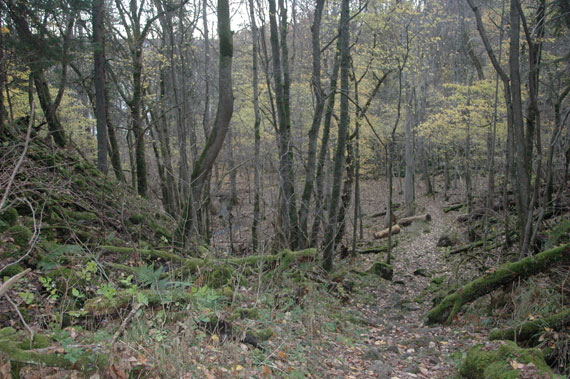 12 November 2010
12 November 2010
| Educational News |
| Lectures and seminars |
| Business and Politics |
| South Asia related Culture |
| New and updated information |
• Lipi Ghosh to be installed as first ICCR Professor at Lund University
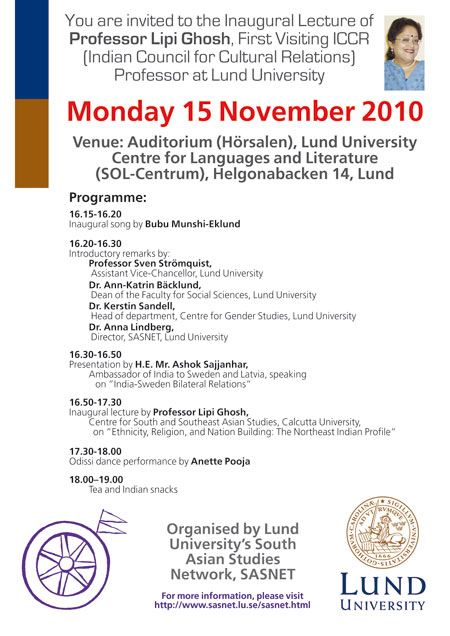 On Monday 15 November 2010, from 16.15, SASNET organises an inaugural seminar with Professor Lipi Ghosh from the Dept. of South and South East Asian Studies, Calcutta University in Kolkata, India, who has just taken up her position as the first Visiting ICCR (Indian Council for Cultural Relations) Chair Professor at Lund University. In her inaugural laecture, Prof. Ghosh will talk about ”Ethnicity, Religion and Nation Building: The Northeast Indian Profile” (read an abstract).
On Monday 15 November 2010, from 16.15, SASNET organises an inaugural seminar with Professor Lipi Ghosh from the Dept. of South and South East Asian Studies, Calcutta University in Kolkata, India, who has just taken up her position as the first Visiting ICCR (Indian Council for Cultural Relations) Chair Professor at Lund University. In her inaugural laecture, Prof. Ghosh will talk about ”Ethnicity, Religion and Nation Building: The Northeast Indian Profile” (read an abstract).
The Indian Ambassador to Sweden, H.E. Mr. Ashok Sajjanhar is the guest of honour, and he will give a presentation on ”India-Sweden Bilateral Relations”.
Lund University wil be represented by Professor Sven Strömquist,
Assistant Vice-Chancellor;
Dr. Ann-Katrin Bäcklund,
Dean of the Faculty for Social Sciences;
Dr. Kerstin Sandell,
Head of department, Centre for Gender Studies; and
Dr. Anna Lindberg, SASNET
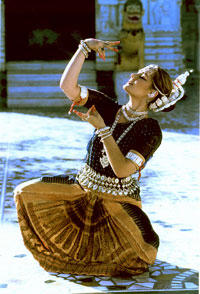 The seminar will wind up with a dance performance by the professional Odissi artist Anette Pooja (photo by Jan Fleischmann) from Gothenburg, and a mingling session where tea and Indian snacks will be served.
The seminar will wind up with a dance performance by the professional Odissi artist Anette Pooja (photo by Jan Fleischmann) from Gothenburg, and a mingling session where tea and Indian snacks will be served.
Venue for the seminar: Auditorium (hörsalen), Lund University’s Centre for Languages and Literature (SOL-Centrum), Helgonabacken 14, Lund.
All are most welcome to the seminar that continues up to 7 P.M.
• SASNET involved in finalizing the new ICCR professorship
Professor Lipi Ghosh arrived at Lund University on 9 November 2010. She will stay in Sweden for the rest of the academic year 2010/11, and be hosted by the Faculty of Social Sciences. Her workplace will be at the university’s Centre for Gender Studies. More information about Prof. Lipi Ghosh.
The new professorship is an outcome of a Memorandum of Understanding between the Indian Council for Cultural Relations (ICCR) and Lund University, that was signed on 22 June 2010 by Mr. Balkrishna Shetty, former Indian Ambassador to Sweden, and Prof. Per Eriksson, Vice-Chancellor, Lund University. In a first phase, the agreement is valid for four years, with a new Indian Professor to be selected each year.
SASNET was actively involved in finalizing the ICCR professorship at Lund University, with strong support from the Embassy of India in Stockholm. In April 2010, SASNET’s director, Dr. Anna Lindberg, participated in an official Lund University delegation to Delhi (more information), where final negotiations were held with representatives of the Ministry of External Affairs, Government of India, and the Indian Council for Cultural Relations, regarding the proposed Indian visiting guest professorship at Lund University.
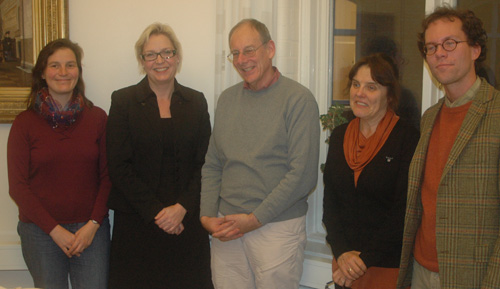 |
| Margret Frenz, Gunilla Carlecrantz (Acting Head of International Relations), Roger Jeffery, Anna Lindberg, and Henrik Hofvendahl (International Relations, in charge of LU’s Asia educational activities). |
• Roger Jeffery and Margret Frenz visited SASNET/Lund University
Professor Roger Jeffery and Dr. Margret Frenz, President and Vice-President respectively for the European Association of South Asian Studies (EASAS) visited SASNET and Lund University 8–10 November 2010. They came to discuss closer collaboration between EASAS and SASNET, as well as strenghtening links between Lund University and University of Edinburgh, UK in the field of South Asian studies. Prof. Jeffery is the Director for the Centre for South Asian Studies in Edinburgh, and Dr. Frenz is currently a Visiting Research Fellow at the University of Edinburgh’s Institute for Advanced Studies in the Humanities (but otherwise connected to the University of Leicester).
During their stay in Lund, they had long and fruitful discussions with Anna Lindberg and Lars Eklund from SASNET, but they also given an opportunity to meet representatives of the university’s Division of International Relations; the succcessful International Masters programme on Applied Management in Development (LUMID); and Lund University’s Centre of Excellence for Sustainability Studies (LUCSUS).
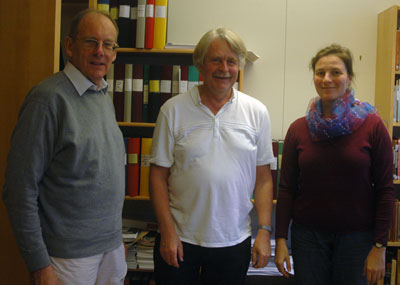 |
| Roger Jeffery, Lars Eklund and Margret Frenz at SASNET’s office. |
• SASNET seminars with Jeffery and Frenz
SASNET and LUCSUS jointly organised a seminar with Roger Jeffery on Tuesday 9 November. The theme for the lecture was ”Trust and the Regulation of Pharmaceuticals: South Asia in a Globalised World”, based on material from a recently-concluded research project comparing the trajectories of pharmaceuticals from producer to patient in South Asia. In his presentation, Prof. Jeffery focused on ongoing disputes over quality standards in Indian generic drug manufacturering,
including allegations that they are responsible for a plague of counterfeit and spurious medicines, within India and globally.
Venue: Java Hall, Scheelevägen 15 B, Lund.
More information about Roger Jeffery’s seminar.
Later the same day, on Tuesday 9 November, Margret Frenz held another SASNET lecture, this time in collaboration with the Dept. of Sociology. She spoke about ”Making the World One’s Home. Goan Migration across the Indian Ocean and Beyond”, focusing on the migration of Goans (from the present day Indian state of Goa) from South Asia to East Africa in the 19th and 20th centuries, and their second migration from East Africa to countries such as the UK and Canada. By analysing their migration patterns, their economic, social and political engagement in East Africa and in this process, their ability to recreate material and social practices, Dr. Frenz highlights how one community has made the world its home.
Venue for the seminar: Conference room 3, Lund University, Dept. of Sociology, Paradisgatan 5, Lund.
More information about Margret Frenz’ seminar.
• Major Research Council grant to project on Asian Migration
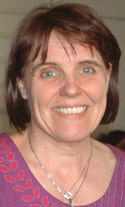 SASNET’s Director, Dr. Anna Lindberg (photo) is one of six researchers at Lund University and University of Gothenburg that were awarded a major three-years grant for a project on Asian Migration by the Swedish Research Council for
research within the fields of Educational Science
2010. The decision was taken on 21 October 2010. The project, entitled ”Transnational Mobility of Higher Education within Asia: An Interdisciplinary Study of Strategies and Educational
Conditions among Young Persons” will be carried out during the period 2011-13, and the total sum awarded is SEK 5.68 m.
SASNET’s Director, Dr. Anna Lindberg (photo) is one of six researchers at Lund University and University of Gothenburg that were awarded a major three-years grant for a project on Asian Migration by the Swedish Research Council for
research within the fields of Educational Science
2010. The decision was taken on 21 October 2010. The project, entitled ”Transnational Mobility of Higher Education within Asia: An Interdisciplinary Study of Strategies and Educational
Conditions among Young Persons” will be carried out during the period 2011-13, and the total sum awarded is SEK 5.68 m.
This interdisciplinary project, led by Dr. Leif Stenberg, Center for Middle Eastern Studies (CMES), aims to study the transnational mobility of higher education within Asia by taking a perspective that situates
individuals at the centre. It will investigate young people’s strategies, experiences, and visions, with individual studies based on fieldwork and data collection in India, Indonesia,
Malaysia, Nepal, Syria, Thailand, and Turkey.
The South Asian angle will be provided by Anna Lindberg. Two South-East Asia related researchers at Lund University’s Centre for East and South-East Asian Studies (ACE) are also members of the research, namely Dr. Ann Kull (on Indonesia), and Dr. Monica Lindberg Falk (on Thailand).
Anna Lindberg will make an individual study of the situation for Nepalese students at some of the major universities in India, focusing on identity creating processes. She will try to illustrate differences, similarities and overlapping between the stories of male and female students, what role the nation plays for them, and what visions they carry for the future. The stories of the Nepalese students wil be put into a context, where the Nepalese policy for higher education and the country’s relation to India is highlighted, especially in the case of possible discrimination of Nepalese students.
More information about the project.
• SASNET/UPF seminar on Sri Lanka after the War
A SASNET/UPF seminar on ”Sri Lanka after the War” will be held in Lund on Wednesday 24 November 2010, 19.00–21.00. The speakers are Dr. Camilla Orjuela, Peace and Development Studies, School of Global Studies, University of Gothenburg, who will talk about ”Sri Lanka after the War: Sustainable Peace or new Conflicts?”; and Professor Peter Schalk, Chair in the History of Religions (in particular in Hinduism and Buddhism) at the Faculty of Theology, Uppsala university, who will talk about ”Defeated but Defiant. The Ilamtamil Resistance Movement after May 2009”. The seminar is co-organised by SASNET and the Association of Foreign Affairs at Lund University (UPF). Venue for the seminar: Café Athen, Sandgatan 2, Lund.
• Time to apply for Erasmus Mundus Asia Regional Mobility programme
 Applications are now open for the Asia Regional Erasmus Mundus Action 2 mobility programme Lot 11. that is administered by Lund University. The applications window opened on 1 November and will be open till December 15th.
Applications are now open for the Asia Regional Erasmus Mundus Action 2 mobility programme Lot 11. that is administered by Lund University. The applications window opened on 1 November and will be open till December 15th.
SASNET has been involved from the beginning regarding this Asian-European Erasmus Mundus mobility programme involving seven South Asian universities, four in India (Delhi University; Jadavpur University, Kolkata; Indian Institute of Technology Kanpur (IITK); and Tata Instititute of Social Sciences, Mumbai), and one each in Pakistan (Karachi University), Nepal (Tribhuvan University), and Bangladesh (Jahangirnagar University).
The project has been named EMEA – Erasmus Mundus Europe Asia, and is coordinated Ms. Elisabeth Axell and Ms. Katarina Wingkvist, International Relations, Lund University. Full information on the EMEA project web site.
SASNET’s information on EMEA and all other South Asia related Erasmus Mundus Action 2 projects.
• Sriniketan professor visited SASNET
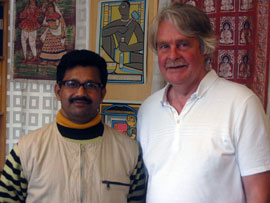 On Monday 8 November 2010, Dr. Sujit Kumar Paul, Senior Lecturer and Vice Principal for the Institute of Rural Reconstruction at Visva-Bharati University in Sriniketan, West Bengal, India, visited SASNET/Lund University. He met with SASNET’s deputy director Lars Eklund (seen on photo together), and also Dr. Olle Frödin from the School of Social Work, Lund University.
On Monday 8 November 2010, Dr. Sujit Kumar Paul, Senior Lecturer and Vice Principal for the Institute of Rural Reconstruction at Visva-Bharati University in Sriniketan, West Bengal, India, visited SASNET/Lund University. He met with SASNET’s deputy director Lars Eklund (seen on photo together), and also Dr. Olle Frödin from the School of Social Work, Lund University.
Dr. Paul has spent four weeks in Denmark on invitation by the Association for World Education (AWE). He has been associated with this Denmark based organisation since 2001, and at its general meeting held at the International People's College (IPC) in Helsingør on 21-23 October 2010, Dr. Paul was elected as new Vice President.
AWE, started in 1995, has a consultative status of the United Nations. It has chapters and individual members all over the world. More information about AWE.
During his stay in Denmark, Dr. Paul has also met researchers working on India related projects at the The Danish School of Education (DPU) in Copenhagen, and on 11-13 November he participates in the Asian Dynamics Initiative conference at Copenhagen University. During a panel on Indigenous Peoples in the 21st Century, he gives a presentation on ”Socio-Economic Development of the Tribals. The Changing Scenario Through Self Help Groups” (more information on the panel, convened by Dr. Peter B Andersen).
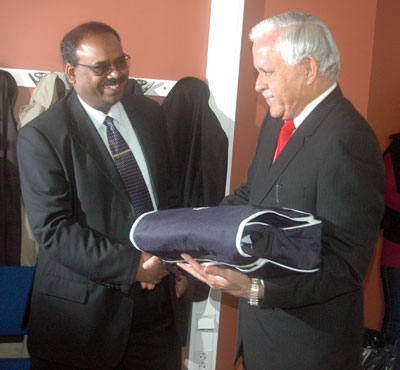 • Mahatma Gandhi seminar at Stockholm University
• Mahatma Gandhi seminar at Stockholm University
On Monday 1 November 2010, SASNET’s deputy director Lars Eklund participated in a half-day seminar at Stockholm University on Mahatma Gandhi, organised by the Embassy of India in Sweden. The seminar, entitled ”Is the Mahatma still relevant?”, was hosted by Prof. Vinayagum Chinapah and the Institute of International Education at Stockholm University and featured presentations by the Ambassador H.E. Mr. Ashok Sajjanhar and Prof. Chinapah (seen on the photo).
Two other prominent speakers with a deep knowledge of Mahatma Gandhi were invited to elaborate on the subject, namely Prof. Björn Wittrock from Uppsala University, Principal of the Swedish Collegium for Advanced Study (SCAS); and Prof. Emeritus Ishtiaq Ahmed, Dept. of Political Science, Stockholm University.
• More information about SASNET and its
activities
See SASNET’s page, http://www.sasnet.lu.se/sasnet.html
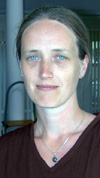 • Swedish Research Council grant to Gunnel Cederlöf
• Swedish Research Council grant to Gunnel Cederlöf
One South Asia related project was given a three-years project grant for the period 2011-13 from the Swedish Research Council for
research within the fields of Humanities and Social Sciences
2010. The decision was taken on 27 October 2010. Associate Professor Gunnel Cederlöf, Dept. of History, Uppsala University, was awarded SEK 2.8 m for a project entitled ”The Formation of Subjects and Citizens. On Borders and Constitution under Colonial Rule in Northeastern Bengal”.
The project focuses on the formation of new polities and ruler–subject
relations as a result of British colonial conquest of northeastern Bengal and
the neighbouring autonomous states in the late18th and early 19th
centuries. It emphasises ecological and climatic structuring conditions
and is a contribution to research on changing spatial relations and
transactions, the transformation of hill–plain relations, and
collisions between synoptic political visions and knowledge systems,
and their implementation on particular landscapes and people. More information.
• Doctoral dissertation on Perceptions of Islam in Pakistan
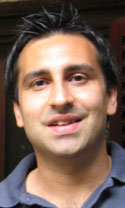 David Hansen, Dept. of Culture Studies and Oriental Languages (IKOS), University of Oslo, defended his doctoral dissertation entitled ”Radical Rhetoric – Moderate Behavior: Perceptions
of Islam, Shari’a, and the Radical Dimension(s)” on Thursday 11 November 2010, at 13.15. The trial lecture was given earlier on the same day.
The thesis is an
empirical study of the twin cities of Islamabad and Rawalpindi, examining everyday life, beliefs, rhetoric, and rituals relating to Islam and Islamic practices, in order to interpret, analyze and present a picture of everyday perceptions of contemporary Islam and what is increasingly related to as ”the new face of Islam” or ”growing radical Islam in Pakistan”. The main approach has been to look at four main dimensions, or core-categories: – Contemporary Islam in Pakistan; – Sufism (piri-muridi, sufiyyat) in Pakistan; – Modernity (jadidiyyat) vis-a-vis the traditional Pakistan; and, – Politics of Otherness (ghairiyyat) in Pakistan. More information on David Hansen’s research.
David Hansen, Dept. of Culture Studies and Oriental Languages (IKOS), University of Oslo, defended his doctoral dissertation entitled ”Radical Rhetoric – Moderate Behavior: Perceptions
of Islam, Shari’a, and the Radical Dimension(s)” on Thursday 11 November 2010, at 13.15. The trial lecture was given earlier on the same day.
The thesis is an
empirical study of the twin cities of Islamabad and Rawalpindi, examining everyday life, beliefs, rhetoric, and rituals relating to Islam and Islamic practices, in order to interpret, analyze and present a picture of everyday perceptions of contemporary Islam and what is increasingly related to as ”the new face of Islam” or ”growing radical Islam in Pakistan”. The main approach has been to look at four main dimensions, or core-categories: – Contemporary Islam in Pakistan; – Sufism (piri-muridi, sufiyyat) in Pakistan; – Modernity (jadidiyyat) vis-a-vis the traditional Pakistan; and, – Politics of Otherness (ghairiyyat) in Pakistan. More information on David Hansen’s research.
The examination committee consists of Dr. Stephen Cohen, Foreign Policy Studies Program, The Brookings Institution in Washington D.C., USA;
Prof. Tor Halvdan Aase, University of Bergen; Prof. Pamela Gwynne Price, IAKH, University of Oslo; and Prof. Ute Hüsken, IKOS. Venue: Universitetets Gamle festsal, Domus Academica, Karl Johans gate 47, Oslo.
More information on the dissertation (only in Norwegian)
• Doctoral dissertation on Physiotherapists in Afghanistan
Jenny Wickford, Department of Clinical Neuroscience and Rehabilitation, Institute of Neuroscience and Physiology, Sahlgrenska Academy, University of Gothenburg, defends her doctoral dissertation entitled ”Physiotherapists in Afghanistan. Exploring, encouraging & experiencing professional development in the Afghan development context” on Monday 15 November 2010, 09.00–13.00. The aim of the thesis is to analyze the matter of supporting professional development of physiotherapists in Afghanistan, and the issues involved in expatriate physiotherapists working with professional development cross-culturally in development contexts. The thesis is based on two field studies. The faculty opponent is Professor Dennis Beach, School of Education & Behavioural Sciences, University of Borås. Venue:
Academicum Hörsal Arvid Carlsson, Medicinaregatan 3, Gothenburg. Read the full-text thesis.
• Doctoral dissertation on Indian Female Gurus in Contemporary Hinduism
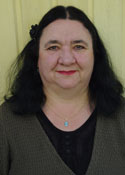 Marie-Thérèse Charpentier, Dept. of of Comparative Religion, Åbo Akademi University in Turku, Finland, will defend her doctoral dissertation entitled ”Indian Female Gurus in Contemporary Hinduism. A Study of Central Aspects and Expressions of Their Religious Leadership” on Friday 26 November 2010, at 12.00. The faculty opponent is Prof. Mathieu Boisvert, Département de sciences des religions at Université du Québec à Montréal (UQAM), Canada.
The thesis focuses on the fact that the rich and complex history of Hinduism primarily has been written by male scholars and has documented the point of view of male spiritual strivings. This fact, together with patriarchal opinions expressed in many authoritative sacred texts, has contributed to creating an image of Indian spirituality in which female religious experience is either absent or considerably marginalized. Venue: Auditorium Armfelt, Arken, Fabriksgatan 2, Turku (Åbo), Finland.
Marie-Thérèse Charpentier, Dept. of of Comparative Religion, Åbo Akademi University in Turku, Finland, will defend her doctoral dissertation entitled ”Indian Female Gurus in Contemporary Hinduism. A Study of Central Aspects and Expressions of Their Religious Leadership” on Friday 26 November 2010, at 12.00. The faculty opponent is Prof. Mathieu Boisvert, Département de sciences des religions at Université du Québec à Montréal (UQAM), Canada.
The thesis focuses on the fact that the rich and complex history of Hinduism primarily has been written by male scholars and has documented the point of view of male spiritual strivings. This fact, together with patriarchal opinions expressed in many authoritative sacred texts, has contributed to creating an image of Indian spirituality in which female religious experience is either absent or considerably marginalized. Venue: Auditorium Armfelt, Arken, Fabriksgatan 2, Turku (Åbo), Finland.
More information.
• 2012 European Conference on South Asian Studies to be held in Lisbon
![]() On 22 october 2010, the European Association of South Asian Studies (EASAS) published its Newsletter for the Summer 2010. It includes a report from the 21st European Conference on Modern South Asian Studies (ECMSAS) that was successfully organised by the University of Bonn in July 2010. Besides, it contains Professor Dietmar Rothermund’s full lecture held at the final session of the conference, on 29 July 2010.
On 22 october 2010, the European Association of South Asian Studies (EASAS) published its Newsletter for the Summer 2010. It includes a report from the 21st European Conference on Modern South Asian Studies (ECMSAS) that was successfully organised by the University of Bonn in July 2010. Besides, it contains Professor Dietmar Rothermund’s full lecture held at the final session of the conference, on 29 July 2010.
The EASAS Newsletter also informs that the next European Conference on South Asian Studies in 2012, the 22nd conference, will be organised by the University Institute of
Lisbon (also known as ISCTE-IUL) in Portugal. The call for panels is expected to go out around December 2010 to
January 2011, with the deadline in April/May 2011.
Another news item is the fact that EASAS has
reached an agreement with the online
journal SAMAJ which will link EASAS to SAMAJ. From 2011 onwards, there will be one additional issue of Samaj each year for which
EASAS will take responsibility (more details on SAMAJ).
• Anna Lindberg and Heinz Werner Wessler members of EASAS new Council
The European Association of South Asian Studies General Meeting was held on 27 July 2010 at the University of Bonn, in connection with the
ECMSAS conference. A new Council was elected: Professor Roger Jeffery, University of Edinburgh was re-elected President, Dr Margret Frenz, University of Leicester and Edinburgh, was re-elected Vice-President, and Professor Ulrike Müller-Böker, University of Zurich, was elected Treasurer. The extended Council was elected for the first time since the re-organisation of EASAS in 2009. SASNET’s Director, Dr. Anna Lindberg (Lund University) was elected to become one of its members. The other Council members are Dr Nicolas Jaoul (École des Hautes Études en Sciences Sociales, Paris), Professor Rosa Maria Perez (ISCTE-IUL, Lisbon),
Dr Danuta Stasik (University of Warsaw), Dr Heinz-Werner Wessler (now Uppsala University), and Dr John Zavos (University of Manchester).
Read the EASAS Summer 2010 Newsletter.
• New board constituted for Nordic Forum for South Asia
On 29 October 2010, a new board was constituted for the Nordic Forum for South Asia (NoFSA). This Nordic network runs an apolitical mailing-list providing members
useful information about current events and interesting reading
to people in the Nordic countries who deal with South Asia in
some capacity (researchers, students, volunteer organizations,
journalists, etc.). NoFSA, originally the
Norwegian Forum for South Asia, is administered from the University of Oslo, and led by PhD Candidate Kenneth Nielsen at the Centre for Development and the Environment (SUM).
The new board has representatives from Norway, Denmark, Sweden and Finland, and the ambition is to encourage South Asianists from all the Nordic countries to contribute more actively to the networking activities. Besides Kenneth Nielsen, the board consists of Ram Gupta, Dept. of Linguistics and Scandinavian Studies, University of Oslo, Norway (in charge of NoFSA’s web page); Uwe Skoda, Institute of History and Area Studies, Aarhus University, Denmark; Lars Eklund, SASNET, Lund University, Sweden; and Sirpa Tenhunen, Dept. of Social and Cultural Anthropology, University of Helsinki, Finland.
To join NoFSA, send an e-mail request to nofsa-net-owner@sum.uio.no, with information about yourself. Once accepted, people can participate in the list discussions or contribute
with relevant information by sending emails to the group, emails being distributed to all list members. Currently NoFSA has almost 250 members.
NOFSA is also on facebook. Many lively discussions take place there. Go for the Facebook Group.
• Nordic Centre in India consortium secretariat moved to Finland
 The Nordic Centre in India (NCI), established in 2001 as a consortium of Nordic universities and research institutions, has moved its secretariat from Uppsala University to Finland. It is now based at the Institute of Public Health and Clinical Nutrition/Unit of Public Health,
University of Eastern Finland,
Kuopio campus. Dr. Mirja Juntunen continues howevere to the NCI Director.
The consortium currently consists
of 22 member universities in the Nordic countries (5 in Sweden,
3 in Norway, 4 in Denmark, 8 in Finland, 1 in Iceland, plus NIAS in Copenhagen).
NCI aims at supporting collaboration on research and education
between the Nordic countries and India. It runs educational courses for Nordic students in India at different universities in India and keeps a flat with rooms available to rent in Delhi.
The Nordic Centre in India (NCI), established in 2001 as a consortium of Nordic universities and research institutions, has moved its secretariat from Uppsala University to Finland. It is now based at the Institute of Public Health and Clinical Nutrition/Unit of Public Health,
University of Eastern Finland,
Kuopio campus. Dr. Mirja Juntunen continues howevere to the NCI Director.
The consortium currently consists
of 22 member universities in the Nordic countries (5 in Sweden,
3 in Norway, 4 in Denmark, 8 in Finland, 1 in Iceland, plus NIAS in Copenhagen).
NCI aims at supporting collaboration on research and education
between the Nordic countries and India. It runs educational courses for Nordic students in India at different universities in India and keeps a flat with rooms available to rent in Delhi.
More
information on the Nordic Centre in India
• Humboldt University searches for researchers on youth, migration and religious
identities
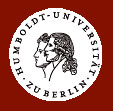 The chair for Islam in Asian and African Societies at the Humboldt University of Berlin/Germany seeks to
establish an international research group in 2011 dealing with the topic youth, migration and religious
identities in (trans-)regional contexts. An announcement has been issued, for interested researchers to take part in establishing such a
cross-regional research group. The theme is “Islam on the Move: Youth, Migration and Religious Identities in (Trans-)Regional Contexts”. The project aims at
investigating the effects of migration on life courses, Muslim identities and religious practices of Muslim youth
in different parts of the Modern Islamic world, preferably in Central, Southern and Southeast Asia. Young scholars in these regions, who are working
in the fields of social anthropology, Modern Islamic studies, migration studies and related fields, are therefore requested to join the
research group at the Humboldt University for a period of one year (April 2011 – March 2012). They should contact Prof. Manja Stephan at the Institute for Asian and African Studies at Humboldt University. Fellowships are
available through the EU sponsored Erasmus Mundus programme. More information.
The chair for Islam in Asian and African Societies at the Humboldt University of Berlin/Germany seeks to
establish an international research group in 2011 dealing with the topic youth, migration and religious
identities in (trans-)regional contexts. An announcement has been issued, for interested researchers to take part in establishing such a
cross-regional research group. The theme is “Islam on the Move: Youth, Migration and Religious Identities in (Trans-)Regional Contexts”. The project aims at
investigating the effects of migration on life courses, Muslim identities and religious practices of Muslim youth
in different parts of the Modern Islamic world, preferably in Central, Southern and Southeast Asia. Young scholars in these regions, who are working
in the fields of social anthropology, Modern Islamic studies, migration studies and related fields, are therefore requested to join the
research group at the Humboldt University for a period of one year (April 2011 – March 2012). They should contact Prof. Manja Stephan at the Institute for Asian and African Studies at Humboldt University. Fellowships are
available through the EU sponsored Erasmus Mundus programme. More information.
• Young researchers invited to meet Nobel Laureates at Lindau
 Each year, since 1951, large number of young students and researchers come from all over the world to the small town of Lindau on Lake Constance in southern Germany. They go there to meet and interact with 20 to 25 Nobel Prize Laureates in Natural Sciences and Medicine. Intermediaries from universities and research institutions worldwide select the participants based on strict criteria. Since 2004, there is an addition to these Lindau Meetings, as they are called, with a Meeting of Nobel Laureates in Economic Sciences every second year.
Each year, since 1951, large number of young students and researchers come from all over the world to the small town of Lindau on Lake Constance in southern Germany. They go there to meet and interact with 20 to 25 Nobel Prize Laureates in Natural Sciences and Medicine. Intermediaries from universities and research institutions worldwide select the participants based on strict criteria. Since 2004, there is an addition to these Lindau Meetings, as they are called, with a Meeting of Nobel Laureates in Economic Sciences every second year.
The Lindau meetings usually cover, in turn at intervals of three years, the three natural science disciplines of the Nobel Prize: physics, chemistry, and physiology or medicine. However in certain years, as in 2005 and 2010, all three disciplines come together. At the 2010 Lindau Meeting from 27th June to 2nd July, 800 young researchers turned up.
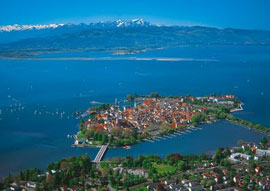 The next Lindau Meeting, the 61st in order, is scheduled from 26 June to 1 July 2011. This year the Science meeting will be dedicated to Physiology/Medicine and related disciplines only, and open for 550 young researchers. Undergraduate, Masters and Doctoral students as well as Postdoctoral scientists can apply to this meeting through intermediary institutions in the young researchers’ home country.
The next Lindau Meeting, the 61st in order, is scheduled from 26 June to 1 July 2011. This year the Science meeting will be dedicated to Physiology/Medicine and related disciplines only, and open for 550 young researchers. Undergraduate, Masters and Doctoral students as well as Postdoctoral scientists can apply to this meeting through intermediary institutions in the young researchers’ home country.
In end-August 2011, the 4th Meeting in Economic Sciences will then take place at Lindau. About 450 young economists from all over the World will meet the Economics Laureates.
In India, the relevant intermediary institution is the Department of Science and Technology, Government of India; in Bangladesh it is the Bangladesh Academy of Sciences (with a separate web page dedicated to Lindau-Bangladesh, go for it); and in Pakistan there are two intermediary institutions, namely the Committee on Science and Technological Cooperation (COMSTECH), and the Pakistan Science Foundation (PSF). More information on the 2011 Lindau Meetings.
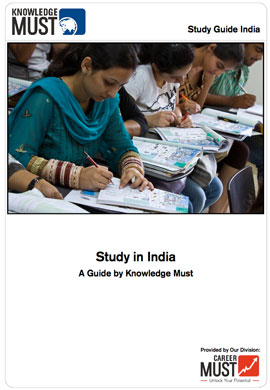 • Knowledge Must published book on Study in India
• Knowledge Must published book on Study in India
Knowledge Must, is an organisation based in India (New Delhi) and Germany (Berlin) assisting students, professionals, and organisations to cross cultural boundaries, mainly between South Asia and the Western world. It offers career counselling, study and work experience, language immersion, culture-specific and process-oriented training, individualized travel arrangements, and intercultural events. More information about Knowledge Must.
Knowledge Must also runs a weblog, discussing global and intercultural communication, cultural exchange, and intercultural issues, especially between India/South Asia and the Western world. Go for the weblog.
Knowledge Must has now published a useful book entitled ”Study in India – A Guide by Knowledge Must”, which is available for
free download from the organisation’s website on a individual,
non-commercial usage.
The authors have made it a point to cover all important aspects of studying as a
foreigner in India. Life for international students will be so much
easier once they figure out the logistical requirements and the Indian
cultural environment. In addition to answering the most pressing
questions, the guide features valuable insights ranging from logistics
such as visa procedures and accommodation arrangements to cultural
background information and inspiration for how to spend one's leisure time. Go for the download page.
• South Asian Idea free learning resource for college students in South Asia
The South Asian Idea is a free learning resource for college students in South Asia, managed by Dr. Anjum Altaf, Visiting Fellow at the Sustainable Development Policy Institute (SDPI), Islamabad,
Pakistan (with a PhD from Stanford University in 1983). The resource aims to disseminates the ideas of academics to a younger audience in order to nurture an informed citizenry. The aim is to promote critical thinking and understanding across borders through structured conversations on topics of common interest. More information.
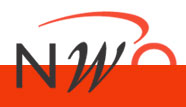 • PhD and Post-doc positions available for Eurasian Empires programme
• PhD and Post-doc positions available for Eurasian Empires programme
The Netherlands Organisation for Scientific Research (NWO) Division for the Humanities offers 6 PhD positions and 2 Post-doc positions in the field of Comparative History, for a Eurasian Empires programme, that will be carried out as an interdisciplinary project at three Dutch Universities (Leiden, Amsterdam, Nijmegen). The NWO Division for the Humanities funds scientific research in the area of history, art history, archeology, language, literature, theology, philosophy, film, music and theatre studies. The Eurasian empires programme examines cohesion in the context of dynastic rulership ca. 1300-1800. The researchers in our program will analyze processes of integration and identity formation around imperial dynastic centres in Europe, West and South Asia, East Asia. The research group explores this question by investigating the key structures, relations and representations of rulers, courts, and empires. Deadline for aplications is 1 January 2011. More information.
• Yale University announces positions in South Asian Studies
 The South Asian Studies Council of The MacMillan Center, Yale University, USA, invites applications for Post Doctoral Fellowships in South Asian Studies (Humanities and Social Sciences) for the period 2011– 2012. The Council expects to
make up to three appointments with the possibility of a one-year renewal. Candidates
must have research and teaching experience relevant to modern and contemporary South
Asia, in the humanities or social sciences. Candidates with a PhD in South Asian History
and other Humanities including Cinema, Literatures, Music and History of Art are
especially encouraged to apply. Applications are accepted immediately with review beginning on January 10, 2011,
and continuing until the selections are final. More information.
The South Asian Studies Council of The MacMillan Center, Yale University, USA, invites applications for Post Doctoral Fellowships in South Asian Studies (Humanities and Social Sciences) for the period 2011– 2012. The Council expects to
make up to three appointments with the possibility of a one-year renewal. Candidates
must have research and teaching experience relevant to modern and contemporary South
Asia, in the humanities or social sciences. Candidates with a PhD in South Asian History
and other Humanities including Cinema, Literatures, Music and History of Art are
especially encouraged to apply. Applications are accepted immediately with review beginning on January 10, 2011,
and continuing until the selections are final. More information.
• More information about South Asia related
research at Swedish and Nordic universities
See SASNET’s page, http://www.sasnet.lu.se/research.html
• More information about South Asia related
education at Swedish and Nordic universities
See SASNET’s page, http://www.sasnet.lu.se/education.html
• Asian Dynamics Initiative conference on Asian Diversity in a Global Context
 The Asian Dynamics Initiative (ADI) at the University of Copenhagen holds its annual international conference entitled ”Asian Diversity in a Global Context” 11–13 November 2010.
The Asian Dynamics Initiative (ADI) at the University of Copenhagen holds its annual international conference entitled ”Asian Diversity in a Global Context” 11–13 November 2010.
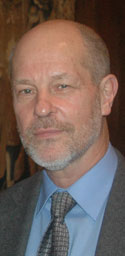 The opening day of the conference was allocated to a big public event with invited keynote speakers, including David Ludden (photo), Professor of Political Economy and Globalization, Department of History, New York University, who presented a paper on ”Diversity, Inequity, and Conflict in Global Asia” (read an abstract).
The opening day of the conference was allocated to a big public event with invited keynote speakers, including David Ludden (photo), Professor of Political Economy and Globalization, Department of History, New York University, who presented a paper on ”Diversity, Inequity, and Conflict in Global Asia” (read an abstract).
The following two days are made up of 10–12 parallel panels and workshops under the common theme ”Asian
Diversity in a Global Context”. The goal is to generate deeper and fuller insights into the political, social, cultural and economic changes facing Asia in the 21st century. Some of the panels are specifically related to South Asia:
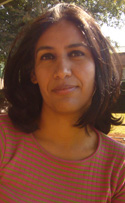 – Governing Difference: Explorations in Identity and Equality in the Global South, convened by Dr. Ravinder Kaur (photo to the right).
– Governing Difference: Explorations in Identity and Equality in the Global South, convened by Dr. Ravinder Kaur (photo to the right).
– The Transmission of Sanskrit Medical Literature in India, convened by Dr. Kenneth Zysk
– Indigenous people in the 21st Century Asia: Identities and Stategies for self-determination, convened by Dr. Peter B. Andersen
'Asian Diversity in a Global Context' is the third in the series of annual conferences initiated by ADI and the University of Copenhagen in 2008. ADI aims at expanding research and teaching on Asia as well as strengthening the university's global networks in studies of Asia.
See the full programme for the Asian Diversity in a Global Context conference.
• 4th Gendering Asia Network Conference in Copenhagen
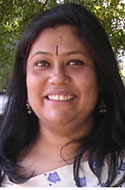 The 4th Gendering Asia Network Conference is held in Copenhagen 12–13 November, in connection with the Asian Dynamics Initiative conference (see above). It is organised by the Gendering Asia Network, a network being funded for the period 2010–2012 by NordForsk – an Oslo based Nordic organisation with responsibility for cooperation on research and researcher training in the Nordic region. This network is open to Nordic students and scholars working primarily within the postdisciplinary field of gender studies, and also to those whose main focus is not gender, but who include a gender perspective in the study of Asia.
The themes for the Copenhagen conference are: – Effects of gendered Asia; –
Gendered processes constructing Asia; and – How does the application of gender theory make a difference to the knowledge we construct of Asia? The keynote speakers include Dr. Anindita Datta, Assistant Professor at the Dept. of Geography, Delhi School of
Economics, India (photo).
More information about the conference.
The 4th Gendering Asia Network Conference is held in Copenhagen 12–13 November, in connection with the Asian Dynamics Initiative conference (see above). It is organised by the Gendering Asia Network, a network being funded for the period 2010–2012 by NordForsk – an Oslo based Nordic organisation with responsibility for cooperation on research and researcher training in the Nordic region. This network is open to Nordic students and scholars working primarily within the postdisciplinary field of gender studies, and also to those whose main focus is not gender, but who include a gender perspective in the study of Asia.
The themes for the Copenhagen conference are: – Effects of gendered Asia; –
Gendered processes constructing Asia; and – How does the application of gender theory make a difference to the knowledge we construct of Asia? The keynote speakers include Dr. Anindita Datta, Assistant Professor at the Dept. of Geography, Delhi School of
Economics, India (photo).
More information about the conference.
• ADI conference followed by two-day PhD workshop for graduate students
 The Asian Diversity in a Global Context conference (see above) is directly followed by a two-day PhD workshop for graduate students on 14-15 November 2010. The workshop, open to PhD students at any stage of their PhD projects, has the theme ”How can we capture specificities with our approaches and methods?”
It is fully integrated with the conference held on the previous days. PhD students are therefore invited to both submit abstracts for a conference paper in the conference and/or a paper at the PhD workshop. Conference papers must however relate to one of the themes of the conference panels and workshops. Since the conference and the PhD workshop are integrated, participation in both activities will not only expose the participants to a wide variety of international expertise from the humanities and social sciences but also provide an opportunity to interact with both senior and junior scholars as well as other PhD students.
The Asian Diversity in a Global Context conference (see above) is directly followed by a two-day PhD workshop for graduate students on 14-15 November 2010. The workshop, open to PhD students at any stage of their PhD projects, has the theme ”How can we capture specificities with our approaches and methods?”
It is fully integrated with the conference held on the previous days. PhD students are therefore invited to both submit abstracts for a conference paper in the conference and/or a paper at the PhD workshop. Conference papers must however relate to one of the themes of the conference panels and workshops. Since the conference and the PhD workshop are integrated, participation in both activities will not only expose the participants to a wide variety of international expertise from the humanities and social sciences but also provide an opportunity to interact with both senior and junior scholars as well as other PhD students.
This workshop is organized by a group of researchers at the University of Copenhagen who have participated in the development of the university's Asian Dynamics Initiative and in organizing the ‘Asian Diversity in a Global Context' conference.
The members of the workshop faculty are a number of specially invited international mentors (including Prof. Paul Bailey, University of Edinburgh, and Prof. Nandini Sundar, Delhi University/Yale), and three mentors from the University of Copenhagen (Associate Professor Birgitte R. Sørensen, Anthropology, Associate Professor Ravinder Kaur, South Asian Studies, and Prof. Jørgen Delman, China Studies).
More information about the PhD Course and registration.
• Environment Technology and
Sustainable Development conference in Gorakhpur
The National Conference on
Environment Technology and
Sustainable Development in
India will be held in Gorakhpur, Uttar Pradesh state, India, on 12 – 14 November 2010. It is organised by the Dept. of Geography at
D.D.U. Gorakhpur University. The main themes
will resolve around issues such as: – The concept of sustainable development; – Disparity in development; – Traditional vs. Western technology; – Impact of environmental degradation; and – Capital intensive technology & the nexus of
decision makers, politicians and privileged
class. Deadline of abstract submission is 10 September 2010. More information.
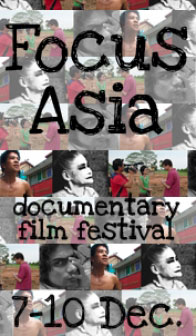 • Second Focus Asia Documentary Film Festival in Lund
• Second Focus Asia Documentary Film Festival in Lund
The Centre for East and South-East Asian Studies (ACE) at Lund University organises its second Focus Asia Documentary Film Festival in Lund 7–10 December 2010. This time the theme of the festival is ”Urban Docs Asia: Identities, Memories, and Struggles in Asian Cities”. Through a series of documentary films by mainly local filmmakers the bustling life of Asian cities such as Mumbai, Lahore, Singapore, Tokyo, Yokohama, Shanghai and Beijing will be explored. The film shows will be held on Wednesday 8th December and Thursday 9th December at the cinema Kino, at Kyrkogatan in central Lund. Tickets will be available free of charge upon request and availability after November 15th.
The film ”Side Effects: Portrait of a Young Artist in Lahore” by the Pakistani-Norwegian Anthropologist and film maker Mashhood Ahmed Sheikh will be shown. Sheikh is connected to Visual Cultural Studies, Dept. of Archaeology and Social Anthropology at University of Tromsø.
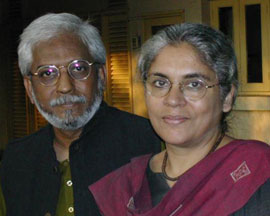 Two Indian film makers have been invited for the festival, namely Prof. K.P. Jayasankar and Prof. Anjali
Monteiro (seen on photo), both working at the Centre for Media
and Cultural Studies, Tata Institute of Social
Sciences (TISS), Mumbai. Their two documentary films ”Saacha” and ”Naata” will be shown.
Two Indian film makers have been invited for the festival, namely Prof. K.P. Jayasankar and Prof. Anjali
Monteiro (seen on photo), both working at the Centre for Media
and Cultural Studies, Tata Institute of Social
Sciences (TISS), Mumbai. Their two documentary films ”Saacha” and ”Naata” will be shown.
On the final day, Friday 10 December 2010, 09.15–16.45, a one-day seminar on ”Cities and the Visual: Ethnography, Documentaries, and Image-based Research” will be held. At the seminar some of the film-makers will give presentations of their work and other scholars working on different types of projects documenting or studying urban issues from different perspectives will also present their works. Monteiro and Jayasankar will give a presentation entitled ”Imagining the City”. Venue for the seminar: Main auditorium, Dept. of Design Sciences,
Sölvegatan 26, Lund.
More information about
the Focus Asia Documentary Film Festival.
• Second Sustainable Utilisation of Tropical Plant Biomass workshop in Kerala
The second International seminar and workshop on Sustainable Utilisation of Tropical Plant Biomass will be held at Kerala University, Karyavattom Campus 14–15 December 2010. It will be jointly organized by the Centre for Bioinformatics, and the Department of Environmental Sciences of Kerala University; Kerala Agricultural University; Kerala State Council of Science Technology and Environment; the SASNET Fermented Foods (based at Anand Agricultural University, Gujarat); and the Dept. of Food Chemistry Applied Nutrition, Lund University.
The aim of the conference is to present a platform for discussing sustainable utilization of the tropical plant biomass addressing not only to the day to day needs of the human beings regarding food, shelter, health and social well-being but also covering aspects of biodiversity, environmental hazards and climatic changes in a long term perspective. Delegates are expected from India, Sri Lanka, Sweden and many other countries. The scientific committee includes Dr. Rickard Öste, Professor, Dept of Food Chemistry And applied Nutrition, Lund University; Dr. Sagarika Ekanayake, Professor, Faculty of Medicine, Jayawardenapura University, Sri Lanka; Dr. Sasikumar Punnekkat, School of Innovation, Design and Engineering, Mälardalen University (MDH), Campus Västerås; and Dr. Rajiv Thottapallil, Division for Electricity and Lightning Research, Uppsala University. More information.
• Gujarat symposium on Higher Education for Knowledge Based Society
An International Symposium on ”Higher Education for Knowledge Based Society: Global Reforms” will be held in Vadodara, Gujarat on 20–21 December 2010. The symposium is organised by the Faculty of Education and Psychology at Maharaja Sayajirao University of Baroda, as part of the faculty’s ongoing Platinum Jubilee (75 years) Celebrations. Researchers and higher education institutions are invited to contribute to the seminar by sharing their experiences and present research and conceptual papers in the symposium on the following sub-themes; – Higher Education: Vision of the New World Realities in the pursuit of Knowledge; Academic Autonomy and Political Authority in Governance of Higher Education; Quality Assurance Practices in Higher Education; Trends and Reforms in Financial Sustainability in Higher Education; and Global Higher Education: Issues and Challenges. Full text papers should be submitted before 16 November 2010.
• Dehradun conference on Himalayan Cultural Heritage
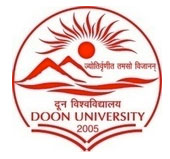 A conference on ”Folklore and Intangible Cultural Heritage of Himalaya” is held at Doon University in Dehradun, India, 19 – 21 January 2011. The aim of the conference is to share the existing knowledge about the history and the current state of folklore and folk performers of Uttarakhand and other Himalayan regions;
to understand how the work of documenting, archiving and studying the folklore of the region can be more organised, networked and available to students and researchers within and outside the region;
to formulate how scholars and educational institutions like Universities can play a role in helping the folk performers to be able to continue the practice of their art; and to explore how the ongoing discussion on Intellectual Property Rights in the area of Intangible Cultural heritage could affect the life of folk performers and the research of scholars. Abstracts should be submitted before 15 December 2010. More information.
A conference on ”Folklore and Intangible Cultural Heritage of Himalaya” is held at Doon University in Dehradun, India, 19 – 21 January 2011. The aim of the conference is to share the existing knowledge about the history and the current state of folklore and folk performers of Uttarakhand and other Himalayan regions;
to understand how the work of documenting, archiving and studying the folklore of the region can be more organised, networked and available to students and researchers within and outside the region;
to formulate how scholars and educational institutions like Universities can play a role in helping the folk performers to be able to continue the practice of their art; and to explore how the ongoing discussion on Intellectual Property Rights in the area of Intangible Cultural heritage could affect the life of folk performers and the research of scholars. Abstracts should be submitted before 15 December 2010. More information.
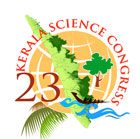 • 23rd Kerala Science Congress in Thiruvananthapuram
• 23rd Kerala Science Congress in Thiruvananthapuram
The 23rd Kerala Science Congress will be held at the Centre for Earth Science Studies in Thiruvananthapuram, 29–31 January 2011. It is organised by the Kerala State Council forScience, Technology and Environment (KSCSTE), an umbrella organization of the research establishments in the South Indian state of Kerala. The 2011 Kerala Science Congress has the focal theme “Science and Technology for Transforming Kerala as a Green Economy”. Researchers, technologists, teachers, industrialists, environmentalists, engineers, planners, policymakers, social workers and research students in Science, Technology and Environmental Sciences are invited to participate. Deadline for registration and submission of abstracts is 30 November 2010. More information.
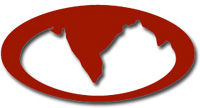 • Fifth Annual SASA Conference in Virginia
• Fifth Annual SASA Conference in Virginia
The Fifth Annual SASA (South Asian Studies Association) Conference will be held 8–10 April 2011 at the Virginia Commonwealth University in
Richmond, Virginia, USA. SASA conferences are remarkable for encouraging networking in a warm,
friendly environment. Conference registration includes a reception at the Virginia Museum of Fine Art (VMFA) housing an
extraordinary collection of both ancient and modern South Asian art,
including an extensive Himalayan collection.Papers are invited on topics exploring cultural and religious interchanges, entertainment cross-fertilization, economic globalization, and the diaspora experience. Deadline for submitting abstracts is January 10, 2011. More information.
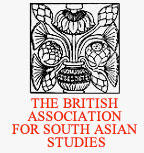 • High time to deliver panel abstracts to the 2011 BASAS conference
• High time to deliver panel abstracts to the 2011 BASAS conference
The 25th Annual British Association of South Asian Studies (BASAS) Conference will be held at the
University of Southampton, UK, 11–13 April 2011. The theme for the conference will be ”Bodies of Power, Forms of Power: South Asia through History and Across Disciplines”. It aims to lay bare the diverse and complex ways in which power is and has been negotiated in the South Asia region. Through the key terms of 'bodies' and 'forms', it is meant to encourage interdisciplinary conversations about the ways in which power is understood, endorsed and undermined in both everyday lives, and at fraught moments of South Asian history. Panel abstracts should be submited before 15 November 2010. More information.
• 5th International Forum on World Civilisations in London
The 5th International Forum on World Civilisations will be held in London, 13–15 September 2011. It will be organised by the History Department of the School of Oriental and African Studies (SOAS), University of London, in collaboration with the Centre for Comparative Studies of World Civilisations of the Chinese Academy of Social Sciences (CASS); the Institute of Cultural Studies of the Shanghai Academy of Social Sciences (SASS); and the School of Foreign Languages and Cultures of Nanjing Normal University, China. The themes for the conference are – Environment: Climate, pollution, resources, migration, conflict; – Beliefs: Shared ground or source of conflict?; – Spectacle: Media, national ceremonies, and displays; and – Globalizing the local: Visualizing new hierarchies. Deadline for proposals is 30 November 2010. More information.
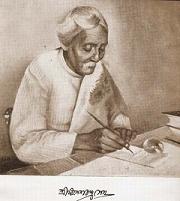 • 2nd International Congress of Bengal Studies in Dhaka
• 2nd International Congress of Bengal Studies in Dhaka
The 2nd International Congress of Bengal Studies is scheduled to be held 17–19 December, 2011. It will be jointly hosted by the University of Dhaka and Bangla Academy, Dhaka, Bangladesh. The theme of the 2011 Congress is ‘Contemporary Bengal Studies’. Papers on other areas of Bengal Studies, including, but not limited to, Literature and Criticism, Comparative Literature, Linguistics, Folklore, Cultural Studies, Media Studies, History, Economics, Sociology, Fine Arts, Philosophy, Anthropology, Archeology, Museology are also invited. Papers should be either in Bengali or in English. Paper proposals/abstracts should be submitted before 15 March 2011. More information.
• Other conferences connected to South Asian
studies all over the World
See SASNET’s page, http://www.sasnet.lu.se/conferences.html#conf
Important lectures and seminars in Scandinavia
• University of Gothenburg organises Global Week
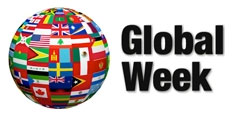 The University of Gothenburg is hosting a Global Week with an extensive programme of seminars, workshops and other activities, many of them related to South Asia, during the period 15–19 November 2010. The aim is to discuss and debate important global issues affecting higher education.
The University of Gothenburg is hosting a Global Week with an extensive programme of seminars, workshops and other activities, many of them related to South Asia, during the period 15–19 November 2010. The aim is to discuss and debate important global issues affecting higher education.
The programme includes a network meeting for EURAXESS Sweden, a European network consisting of 200 service centres in 35 countries, on Monday 15 November. The theme of this meeting is: Service to international researchers and PhD students. More information.
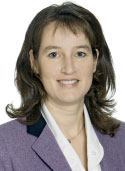 |
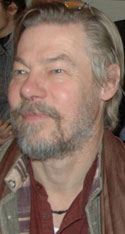 |
| Alexandra Krettek and Åke Sander. | |
On Wednesday 17 November, a seminar entitled ”The Global University” will be held, that features presentations of a number of International research projects, some of them dealing with South Asia, funded by Gothenburg University. They include projects carried out by Dr. Alexandra Krettek, Nordic School of Public Health in Gothenburg; and by Dr. Åke Sander, Department of Literature, History of Ideas, and Religion, Gothenburg University. More information about the Global University seminar.
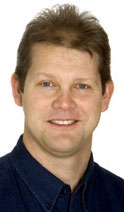 On Thursday 18 November, an International symposium will be held about the recent development of microbes that are developing a resistance to antibiotics reducing the effectiveness in such drugs and leading to greater risk of prlonged illness and greater risk of death. The invited speakers this Global Antibiotic Resistance symposium include Associate Professor Joakim Larsson (photo) from the Dept. of Physiology, Institute of Neuroscience and Physiology, Sahlgrenska Academy at Gothenburg University. Dr. Larsson has been involved in a major research project on environmental effects of pharmaceuticals in India. More information about the Global Antibiotic Resistance seminar.
On Thursday 18 November, an International symposium will be held about the recent development of microbes that are developing a resistance to antibiotics reducing the effectiveness in such drugs and leading to greater risk of prlonged illness and greater risk of death. The invited speakers this Global Antibiotic Resistance symposium include Associate Professor Joakim Larsson (photo) from the Dept. of Physiology, Institute of Neuroscience and Physiology, Sahlgrenska Academy at Gothenburg University. Dr. Larsson has been involved in a major research project on environmental effects of pharmaceuticals in India. More information about the Global Antibiotic Resistance seminar.
 On 18–19 November, the Heritage Studies initiative at University of Gothenburg, based at the Dept. of Conservation, organises a lunch to lunch workshop entitled ‘Multiple roles of heritage – pasts, conflicts, present time.
The case of the Union Carbide former plant in Bhopal, India: “Requiem & Revitalization”’. It aims at discussing conflicting and difficult heritage, industrial heritage and industrialization, global and local consequences, and possible means, models and pathways for improvement of heritage practices. The invited speakers incude Moulshri Joshi (photo), Partner & Principal Architect, SpaceMatters, New Delhi and Assistant Professor at the School of Planning and Architecture in New Delhi; Amritha Ballal, partner and principal architect SpaceMatters, New Delhi (and also a Master's student at the Norwegian University of Science and Technology (NTNU) in Trondheim); and Suditya Sinha, partner and principal architect SpaceMatters, New Delhi. More information on the Heritage Studies initiative seminar.
On 18–19 November, the Heritage Studies initiative at University of Gothenburg, based at the Dept. of Conservation, organises a lunch to lunch workshop entitled ‘Multiple roles of heritage – pasts, conflicts, present time.
The case of the Union Carbide former plant in Bhopal, India: “Requiem & Revitalization”’. It aims at discussing conflicting and difficult heritage, industrial heritage and industrialization, global and local consequences, and possible means, models and pathways for improvement of heritage practices. The invited speakers incude Moulshri Joshi (photo), Partner & Principal Architect, SpaceMatters, New Delhi and Assistant Professor at the School of Planning and Architecture in New Delhi; Amritha Ballal, partner and principal architect SpaceMatters, New Delhi (and also a Master's student at the Norwegian University of Science and Technology (NTNU) in Trondheim); and Suditya Sinha, partner and principal architect SpaceMatters, New Delhi. More information on the Heritage Studies initiative seminar.
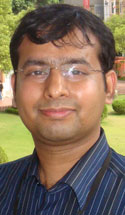 On 18–19 November, the School of Global Studies, University of Gothenburg, organises two seminars with Dr. Jagannath P. Panda, Research Fellow at the Institute for Defense Studies and Analyses (IDSA), New Delhi. On
Thursday 18 November 2010, 18.00–20.00, he holds a public lecture entitled ”Computing the China-India Complexity: A Strategic Perspective”. Venue: Global Studies,
room 220 in Annedalsseminariet, Campus Linné, Seminariegatan 1, Gothenburg. More information.
On 18–19 November, the School of Global Studies, University of Gothenburg, organises two seminars with Dr. Jagannath P. Panda, Research Fellow at the Institute for Defense Studies and Analyses (IDSA), New Delhi. On
Thursday 18 November 2010, 18.00–20.00, he holds a public lecture entitled ”Computing the China-India Complexity: A Strategic Perspective”. Venue: Global Studies,
room 220 in Annedalsseminariet, Campus Linné, Seminariegatan 1, Gothenburg. More information.
On Friday 19 November 2010, 10.00–12.00, Dr. Panda holds another lecture entitled ”China's New Multilateralism & the complexity of Brazil, Russia, India and China”. Venue: Global Studies,
room 402 in Annedalsseminariet, Campus Linné, Seminariegatan 1, Gothenburg. More information.
• Uppsala seminar on Shakti – Womens’ Power in India
Dr. Alessandra Consolaro, currently Guest Researcher at the Dept. of Linguistics and Philology, Uppsala University, holds a public lecture on ”Shakti Past and Present: Aspects of Womens’ Power in India” on Tuesday 16 November 2010, at 18.15. Starting from a brief review of the classic iconography of the Devi/Shakti, Dr. Consolaro will address some examples of contemporary re-reading of such representations in India, focussing on politics and the women's movement. Her field of interest and research covers South Asia history (20th century, nationalism and decolonization); colonial and postcolonial theory; nationalist movement in South Asia and its relations with the standardization of modern Hindi language and literature; contemporary Hindi fiction: critical study and translation. Venue: Uppsala University, History of Religions, Engelska Parken, Thunbergsvägen 3 B, room 1-1062. More information.
• Copenhagen seminar on the fight for land rights in India
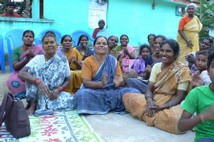 The Swallows in Denmark presents a lecture and film on the fight for land rights in India at Verdenskulturcentret in Copenhagen on Tuesday 16 November 2010, 19.00–21.00.
At the event, Assistant Professor Dayabati Roy, Post Doc at the Dept. of Cross-Cultural and Regional Studies, University of Copenhagen, will show her documentary film entitled 'In the name of development' about public opposition against acquisition of agricultural land by the state and large companies in rural West Bengal. The film focuses on women's role in the land movements. It has a critical view of the consequences of globalisation and economic growth on people living in rural India. Dayabati Roy will introduce the film and afterwards there will be room for debate.
The event is a part of a week long focus on India at Verdenskulturcentret from November 11 to November 16.
Venue: Verdenskulturcentret, Nørre Allé 7, Copenhagen. More information.
The Swallows in Denmark presents a lecture and film on the fight for land rights in India at Verdenskulturcentret in Copenhagen on Tuesday 16 November 2010, 19.00–21.00.
At the event, Assistant Professor Dayabati Roy, Post Doc at the Dept. of Cross-Cultural and Regional Studies, University of Copenhagen, will show her documentary film entitled 'In the name of development' about public opposition against acquisition of agricultural land by the state and large companies in rural West Bengal. The film focuses on women's role in the land movements. It has a critical view of the consequences of globalisation and economic growth on people living in rural India. Dayabati Roy will introduce the film and afterwards there will be room for debate.
The event is a part of a week long focus on India at Verdenskulturcentret from November 11 to November 16.
Venue: Verdenskulturcentret, Nørre Allé 7, Copenhagen. More information.
See the poster for the film show.
• DIIS seminar on Sino-Indian Relations in Strategic Asia
Dr. Jagannath P. Panda, Research Fellow at the Institute for Defense Studies and Analyses (IDSA), New Delhi participates in a Copenhagen seminar on ”Sino-Indian Relations in Strategic Asia” on
Wednesday 17 November 2010, 14.00–16.00. Dr. Panda is currently a guest researcher at the Institute for Security and Development Policy (ISDP) in Stockholm.
Luke Anthony Patey, Project Researcher at DIIS, is another speaker. His research focuses on the rise of Asian national oil companies from China, India and Malaysia. The seminar is organised by the Danish Institute for International Studies (DIIS). Venue: DIIS,
Main Auditorium,
Strandgade 71, ground floor, Copenhagen. More information.
• Uppsala seminar on the World Social Science Report 2010
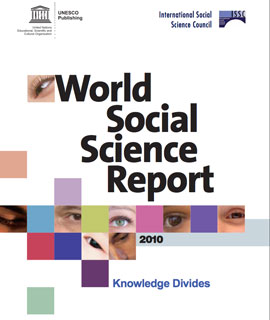 A book launch seminar on the World Social Science Report 2010, on the theme ”Knowledge Divides”, will be held in Uppsala on Thursday 18 November 2010, at 16.15. Produced by the International Social Science Council (ISSC) and co-published with UNESCO, the report is the first comprehensive overview of the field in over a decade. Hundreds of social scientists from around the world contributed their expertise to the publication. It was officialy launched at UNESCO Headquarters in Paris in June 2010.
A book launch seminar on the World Social Science Report 2010, on the theme ”Knowledge Divides”, will be held in Uppsala on Thursday 18 November 2010, at 16.15. Produced by the International Social Science Council (ISSC) and co-published with UNESCO, the report is the first comprehensive overview of the field in over a decade. Hundreds of social scientists from around the world contributed their expertise to the publication. It was officialy launched at UNESCO Headquarters in Paris in June 2010.
The report partly focuses on South Asia, and the co-authors Venni V. Krishna and Usha Krishna write: ”Barring some centres of excellence in India, social sciences as a whole are accorded low priority in the whole South Asian region.”
The seminar in Uppsala is held at the Swedish Collegium for Advanced Studies, SCAS, in Linneanum (Botanical Gardens), Uppsala. The invited speakers include Gudmund Hernes, Francoise Caillods, Kerstin Sahlin, Arne Jarrick, Björn Wittrock, and Daniel Tarschys.
More info about the World Science Report 2010, with link to full-text document.
More information about the Uppsala seminar.
• 3rd Annual Contemporary India Seminar in Oslo
 The 3rd Annual Contemporary India Seminar will be held in Oslo on Monday 22 November 2010. It is organised by the Centre for Development and the Environment (SUM) at the University of Oslo. The theme for the 2010 Contemporary India Seminar will be ”Transitions”, focusing on social change often narrated in tropes of transition. Earlier generations of rural economists and sociologists saw the rural economy as undergoing a change from a feudal to a more or less complete capitalist mode of production. Students of Indian democracy variously see the end of colonial rule; the decline of the Congress system; or the implementation of the Mandal Commission report as important transitory events that unmistakably altered the terrain of Indian politics. And more recently, the 1991 liberalisation of the economy is highlighted by economists and social scientists as an important watershed that decisively changed the Indian economy from Nehruvian to Neoliberal.
The 3rd Annual Contemporary India Seminar will be held in Oslo on Monday 22 November 2010. It is organised by the Centre for Development and the Environment (SUM) at the University of Oslo. The theme for the 2010 Contemporary India Seminar will be ”Transitions”, focusing on social change often narrated in tropes of transition. Earlier generations of rural economists and sociologists saw the rural economy as undergoing a change from a feudal to a more or less complete capitalist mode of production. Students of Indian democracy variously see the end of colonial rule; the decline of the Congress system; or the implementation of the Mandal Commission report as important transitory events that unmistakably altered the terrain of Indian politics. And more recently, the 1991 liberalisation of the economy is highlighted by economists and social scientists as an important watershed that decisively changed the Indian economy from Nehruvian to Neoliberal.
The paper presenters include Geir Heierstad, Institute for Defence Studies, Oslo, who will talk about ”Caste in transition – a case from Kolkata, West Bengal”; Per Stċhlberg, Dept. of Media and Communication Studies, Södertörn University, who will talk about ”‘My time is now!’: Media tropes of transition in contemporary India”; and Marie Larsson, Dept. of Social Anthropology, Stockholm University, who will talk about ”Mobilization among Home-Based Workers in the Textile Sector of Ahmedabad, Gujarat: The Self-Employed Women’s Association (SEWA)”. More information.
• Copenhagen seminar on Laila Bokhari’s book on Pakistan
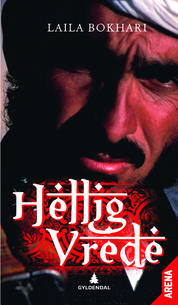 The Danish Institute for International Studies (DIIS) on Copenhagen invites to a seminar and book launch with Laila Bokhari on
”Holy Wrath – My Journey through Pakistan” (Hellig Vrede – Min Reise gjennom Pakistan, Gyldendal, 2010) on
Monday 22 November 2010, 12.00–14.00. Laila Bokhari is currently posted to the political section of the Royal Norwegian Embassy in Islamabad. She has been a research fellow at the Norwegian Defence Research Establishment (FFI) and the Norwegian Institute of International Affairs (NUPI). She has also worked with the UN Security Council’s al-Qaida Taliban Monitoring Team in New York.
The Danish Institute for International Studies (DIIS) on Copenhagen invites to a seminar and book launch with Laila Bokhari on
”Holy Wrath – My Journey through Pakistan” (Hellig Vrede – Min Reise gjennom Pakistan, Gyldendal, 2010) on
Monday 22 November 2010, 12.00–14.00. Laila Bokhari is currently posted to the political section of the Royal Norwegian Embassy in Islamabad. She has been a research fellow at the Norwegian Defence Research Establishment (FFI) and the Norwegian Institute of International Affairs (NUPI). She has also worked with the UN Security Council’s al-Qaida Taliban Monitoring Team in New York.
In her book, Laila Bokhari takes the reader on a tour of cities and the countryside, and visits with the poor as well as the affluent. We meet politicians, generals and enraged Islamists. Participation is free of charge, but registration is required before Friday 19 November at 12 A.M. Venue: DIIS,
Main Auditorium,
Strandgade 71, ground floor, Copenhagen. More information.
• Stockholm seminar on Jewish life in India
Adèle Schreiber, Bachelor of Arts in Art History, and author of a book on Jewish life in India, ”Judiskt liv i Indien”, holds a seminar presenting her book at Stockholm University on Monday 22 November 2010, 15–17. The seminar is organised by the Division of South and Central Asian Studies at the Dept. of
Oriental Languages. Venue: Room 136, building 4, Kräftriket 4 A, Roslagsvägen 101, Stockholm. All are welcome.
More information about the book in a review by Magnus Eriksson in Svenska Dagbladet, January 2010.
• Stockholm seminar on Environmental flows as a tool for climate change adaptation
 A half-day seminar on ”Environmental flows as a tool for climate change adaptation” will be held in Stockholm on Tuesday 23 November 2010, 08.30–12.00. It is jointly organised by Swedish Water House, WWF, SMHI, Water Aid Sweden, and Sida. The seminar will discuss the importance of environmental flows in the context of climate change and its potential to buffer extreme flow regimes. Some of the presentations are directly related to South Asia. Dr. Mats Eriksson from Stockholm International Water Institute (SIWI), and previously Senior Water Specialist at the International Centre for Integrated Mountain Development (ICIMOD) will talk about ”Global outlook with examples from the Himalaya region”; and Dr. John Matthews,
Senior Program Officer at World Wildlife Fund (WWF), will talk about ”Climate adaptation & environmental flows: with examples from the Pakistan floods”. The discussions wil be moderated by Karin Lexén, Director, Swedish Water House. Venue: Aulinsalen, Konserthuset. Hötorget, Stockholm. More information.
A half-day seminar on ”Environmental flows as a tool for climate change adaptation” will be held in Stockholm on Tuesday 23 November 2010, 08.30–12.00. It is jointly organised by Swedish Water House, WWF, SMHI, Water Aid Sweden, and Sida. The seminar will discuss the importance of environmental flows in the context of climate change and its potential to buffer extreme flow regimes. Some of the presentations are directly related to South Asia. Dr. Mats Eriksson from Stockholm International Water Institute (SIWI), and previously Senior Water Specialist at the International Centre for Integrated Mountain Development (ICIMOD) will talk about ”Global outlook with examples from the Himalaya region”; and Dr. John Matthews,
Senior Program Officer at World Wildlife Fund (WWF), will talk about ”Climate adaptation & environmental flows: with examples from the Pakistan floods”. The discussions wil be moderated by Karin Lexén, Director, Swedish Water House. Venue: Aulinsalen, Konserthuset. Hötorget, Stockholm. More information.
• Uppsala lecture on North Indian Ramayana Tradition
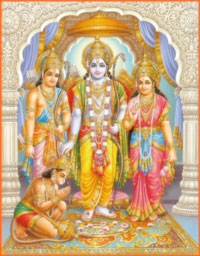 On Tuesday 23 November 2010, 17–19, Professor Danuta Stasik from the University of Warsaw, Poland lectures in Uppsala on ”Socio-cultural Dimensions of the Ramayana Tradition in North
India”. Prof. Stasik has recently published the book ”The Infinite Story: The Past and Present
of the Ramayanas in Hindi”. The seminar is organised by the South Asia Seminar at Uppsala University. Venue: Engelska parken 9-2029. More information.
On Tuesday 23 November 2010, 17–19, Professor Danuta Stasik from the University of Warsaw, Poland lectures in Uppsala on ”Socio-cultural Dimensions of the Ramayana Tradition in North
India”. Prof. Stasik has recently published the book ”The Infinite Story: The Past and Present
of the Ramayanas in Hindi”. The seminar is organised by the South Asia Seminar at Uppsala University. Venue: Engelska parken 9-2029. More information.
• Uppsala seminar on Nature as Calamity and Development as Triumph
 A seminar with Dr. Rohan D’Souza, Assistant Professor at the Centre for Studies in Science Policy at the Jawaharlal Nehru University (JNU) in New Delhi, wil be held i Uppsala on Wednesday 24 November 2010, 10.30–12.00. Dr. D’Souza will lecture about ”Nature as Calamity and Development as Triumph:
Is the Idea of Progress Sustainable?” In 2006, Rohan D’Souza published ”Drowned and Dammed: Colonial Capitalism and Flood control in Eastern India” (1803-1946), Oxford University Press, New Delhi. His concerns range from issues dealing with environmental history, the political economy of nature conservation and history of technology. He has held postdoctoral fellowships at Yale University, University of California (Berkeley) and been a Senior Research Associate at the Centre for World Environmental History, University of Sussex. More about Dr. Rohan D’Souza.
A seminar with Dr. Rohan D’Souza, Assistant Professor at the Centre for Studies in Science Policy at the Jawaharlal Nehru University (JNU) in New Delhi, wil be held i Uppsala on Wednesday 24 November 2010, 10.30–12.00. Dr. D’Souza will lecture about ”Nature as Calamity and Development as Triumph:
Is the Idea of Progress Sustainable?” In 2006, Rohan D’Souza published ”Drowned and Dammed: Colonial Capitalism and Flood control in Eastern India” (1803-1946), Oxford University Press, New Delhi. His concerns range from issues dealing with environmental history, the political economy of nature conservation and history of technology. He has held postdoctoral fellowships at Yale University, University of California (Berkeley) and been a Senior Research Associate at the Centre for World Environmental History, University of Sussex. More about Dr. Rohan D’Souza.
The seminar is organised by the Swedish Development Research Network for Nature, Poverty and Power (DevNet), and the Natural Resource Management and Livelihoods Research School (NRML) based at the Swedish University of Agricultural Sciences (SLU) in Uppsala. It is part of a larger full-day Symposium on ”Ecosystems and Development: Implications for food security, market policies, and rural/urban migration” that NRML organizes the same day. Venue: Lilla Patologen at the Swedish University of Agricultural Sciences, Ulls väg 2 G and Travvägen 12 D, Ultuna, Uppsala. More information about the NRML Symposium.
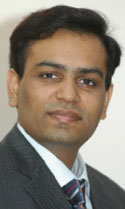 • Aman Agarwal lectures at Jönköping University
• Aman Agarwal lectures at Jönköping University
Aman Agarwal,
Professor of Finance, and
Vice-Chairman for Indian Institute of Finance (IIF) in Delhi/Noida, holds a public lecture at Jönköping University on Tuesday 7 December 2010, at 11.00. Prof. Agarwal, who is also Executive Editor for the Finance India magazine, will speak about ”India – A Rapidly Growing Elephant”, presenting economic, social and technological perspectives.
All are welcome. Venue for the seminar: School of Education and Communication (HLK), conference Hall Hc218, Gjuterigatan 5, Jönköping.
• Helsinki seminar on State Peripheries in Southern
Central Asia
The Finnish Institute of International Affairs (FIIA) and the Ministry for Foreign Affairs of Finland invite to a seminar entitled ”Controlling borderlands?
New Perspectives on State Peripheries in Southern
Central Asia and Northern Afghanistan” in Helsinki on
Wednesday 15 December 2010, 09.00–12.30. Approaches to Central Asia and Afghanistan tend to revolve around issues of Soviet legacy, geo-political interests and resource and security concerns. All too often the focus is on state-level policies. However, Central Asia is a context of insurgency, the narcotics trade and complex ethno-nationalism, and hence local and inter-regional aspects cannot be forgotten - they influence political stability. This seminar primarily asks: how do these factors affect the states in Central Asia? What implications do the ethno-political currents in the region have for the international community? The speakers include
Kristian Berg Harpviken, Director,
Peace Research institute Oslo (PRIO), Norway. Pre-registration necessary before Monday 13 December via web base registration form. Venue:
Finnish Institute of International Affairs,
Kruunuvuorenkatu 4, 2nd Floor, Helsinki. More information.
• Information about South Asia related lectures and seminars
See SASNET's page, http://www.sasnet.lu.se/conferences.html
Business and Politics
• Stockholm debate on India’s economic prospects
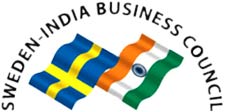 On Wednesday 24 November 2010, at 19.00, the Sweden India Business Council (SIBC) organises a discussion meeting entitled ”Rupee me. Prophecy” in Stockholm. The event is co-organised by the Swedish Trade Council and Södra Teatern. The debated takes off in a statement by Prof. Hans Rosling that in 50
years from now India will be the world's economic superpower. How does this affect the prospects of saving funds in India? A panel of experts will analyze the Indian economy and refine the two
extreme images; India as the new economic success of the machine with IT for the elderly on exports, on
the one hand. Extreme poverty and growing inequality on the other. The experts at disposal are Fredrik
Fexe (Trade Council), Gautam Bhattacharyya, Prabhakar Grandhi (Scandinavia Head of Infosys), Parul
Sharma (CSR manager at Sandvik Asia), Malin Mendel Westberg (SVT) and Charlotte Bohman (Hand in hand).
Indian Ambassador Ashok Sajjanhar and author Siddharth Dhanvant Shanghvi will be guests of honour. Venue: Södra Teatern,
Kägelbanan, Mosebacke Torg 1–3, Stockholm.
On Wednesday 24 November 2010, at 19.00, the Sweden India Business Council (SIBC) organises a discussion meeting entitled ”Rupee me. Prophecy” in Stockholm. The event is co-organised by the Swedish Trade Council and Södra Teatern. The debated takes off in a statement by Prof. Hans Rosling that in 50
years from now India will be the world's economic superpower. How does this affect the prospects of saving funds in India? A panel of experts will analyze the Indian economy and refine the two
extreme images; India as the new economic success of the machine with IT for the elderly on exports, on
the one hand. Extreme poverty and growing inequality on the other. The experts at disposal are Fredrik
Fexe (Trade Council), Gautam Bhattacharyya, Prabhakar Grandhi (Scandinavia Head of Infosys), Parul
Sharma (CSR manager at Sandvik Asia), Malin Mendel Westberg (SVT) and Charlotte Bohman (Hand in hand).
Indian Ambassador Ashok Sajjanhar and author Siddharth Dhanvant Shanghvi will be guests of honour. Venue: Södra Teatern,
Kägelbanan, Mosebacke Torg 1–3, Stockholm.
See the poster for the event.
• SIBC breakfast seminar on Alfa Laval’s India businesses
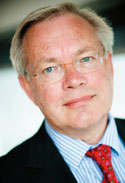 Sweden-India Business Council (SIBC) invites to a Breakfast Seminar in Lund with
Peter Leifland, Executive Vice president of the Alfa Laval Group since
1999 on Tuesday 7 December 2010, at 08.00. The seminar is entitled ”Alfa Laval in India – today and future”. Mr. Leifland has been responsible for Alfa Laval’s sales region of Western Europe, North
America and India. In India, Alfa Laval has been present since 1937. A sales company is based in Pune, and factories in Maharashtra manufacture and supply key
components and systems in Separation, Heat Transfer and Flow
technology. More information.
Sweden-India Business Council (SIBC) invites to a Breakfast Seminar in Lund with
Peter Leifland, Executive Vice president of the Alfa Laval Group since
1999 on Tuesday 7 December 2010, at 08.00. The seminar is entitled ”Alfa Laval in India – today and future”. Mr. Leifland has been responsible for Alfa Laval’s sales region of Western Europe, North
America and India. In India, Alfa Laval has been present since 1937. A sales company is based in Pune, and factories in Maharashtra manufacture and supply key
components and systems in Separation, Heat Transfer and Flow
technology. More information.
• Information about South Asia related business and politics in Sweden
See SASNET's page, http://www.sasnet.lu.se/polbuss.html
South Asia related culture in Scandinavia
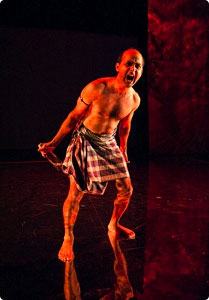 • Bangalore theatre group part of Gothenburg performance
• Bangalore theatre group part of Gothenburg performance
Dance artists from UK, France, China, India and Sweden participate in Re-orientations, a performance to be shown at Pustervik Theatre in Gothenburg on Sunday 14 November 2010, at 18.00. It is a visual and poetic performance about love, identity and the meeting between Asia and Europe. Eleven artists from different Asian and European countries collaborate on stage presenting the story of an adopted child that takes place between the two Asian cities Pondicherry in India and Shanghai in China. The performance is in Swedish, English, Chinese, Hindi and Kannada (spoken in the South Indian state of Karnataka).
A group from Kalakadamba Art Center in Bangalore is part of the venture. They perform traditional Yakshagan theatre.
The dance and theatre show is part of a long-term collaboration between Theatre Pustervik, Teater Eksem, Border Crossings and the Cultural Secretariat of Region Västra Götaland (Västra Götalandsregionen).
More information (only in Swedish).
• Exhibition on Kolam practice part of Indian festival in Stockholm
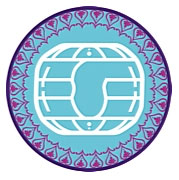 Indian culture in the form of music, dance, film, art and literature is very much in focus in Stockholm during the period 1 October 2010 – 9 January 2011. In a joint effort by Kulturhuset Stockholm, Södra Teatern, Dansens Hus, Bollywoodbio/Bio Rio, Söderbokhandeln and others, a large number of cultural events take place. The entire project is entitled ”Indien/Indien”, and offers meetings with several well-renowned Indian artists, writers and poets, film makers, fashion designers, etc. The initiative comes from Erik Sjöström, Head of Kulturhuset, who has invited other organisers in Stockholm to join. More information about the Indien/Indien project in Stockholm.
Indian culture in the form of music, dance, film, art and literature is very much in focus in Stockholm during the period 1 October 2010 – 9 January 2011. In a joint effort by Kulturhuset Stockholm, Södra Teatern, Dansens Hus, Bollywoodbio/Bio Rio, Söderbokhandeln and others, a large number of cultural events take place. The entire project is entitled ”Indien/Indien”, and offers meetings with several well-renowned Indian artists, writers and poets, film makers, fashion designers, etc. The initiative comes from Erik Sjöström, Head of Kulturhuset, who has invited other organisers in Stockholm to join. More information about the Indien/Indien project in Stockholm.
You can also join the Facebook fan group: http://www.facebook.com/pages/IndienIndien/, which offers constant updated information.
Kulturhuset at Sergels Torg
presents an exhibition of 15 contemporary artists with their roots in India and Pakistan. The exhibition, entitled ”Samtidigt”, will be shown during the entire period, and features works by Anita Khemka, Archana Hande, Bharat Sikka, Gigi Scaria, Hema Upadhyay, Nalini Malani, Pushpamala, Reena Saini Kallat, Rashmi Kaleka, Sheba Chhachhi, Shilpa Gupta, Thugral & Tagra, Vivan Sundaram, and Chitra Ganesh. They represent different strains within modern Indian art.
More information about the art exhibition.
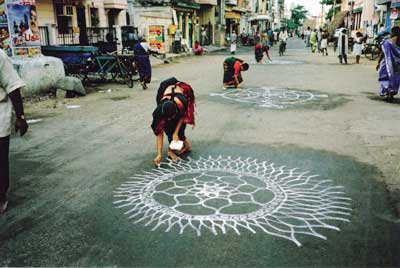 During the period 13 November 2010 – 16 January 2011, Etnografiska Museet presents an exhibition on Kolam, a South Indian practice where women daily draw geometrical images in front of their homes to invite the deities. The exhibition is made by Dr. Anna Laine, Social Anthropologist and Artist, now based at Dalarna University, Campus Falun, but previously connected to the University of Gothenburg where she defended her doctoral dissertation on the Kolam practice in 2009. More information about Anna Laine’s project.
During the period 13 November 2010 – 16 January 2011, Etnografiska Museet presents an exhibition on Kolam, a South Indian practice where women daily draw geometrical images in front of their homes to invite the deities. The exhibition is made by Dr. Anna Laine, Social Anthropologist and Artist, now based at Dalarna University, Campus Falun, but previously connected to the University of Gothenburg where she defended her doctoral dissertation on the Kolam practice in 2009. More information about Anna Laine’s project.
The exhibition at Etnografiska Museet is entitled ”Kolam – flyktiga mönster för ändlös lycka”. The museum is located at Djurgårdsbrunnsvägen 34 in Stockholm. More information.
• Copenhagen performance by eminent Indian Odissi dancer
 Monalisa Ghosh, leading exponent of Odissi Dance from Kolkata, India, performs at Copenhagen, Denmark on Friday 25 November 2010, at 20.00. Monalisa, who has been trained under Guru Kelucharan Mahapatra at Kala Vikash Kendra in Cuttack, Orissa, has performed all over India and also regularly in Western countries. In Kolkata, she has established a Gurukul named Kalajyoti.
Monalisa Ghosh, leading exponent of Odissi Dance from Kolkata, India, performs at Copenhagen, Denmark on Friday 25 November 2010, at 20.00. Monalisa, who has been trained under Guru Kelucharan Mahapatra at Kala Vikash Kendra in Cuttack, Orissa, has performed all over India and also regularly in Western countries. In Kolkata, she has established a Gurukul named Kalajyoti.
At the Copenhagen concert, she will be accompanied by Subhankar Chatterjee on Vocals, Rama Chandra Behra on Mardala, and Amit Biswas on Manjeera. On the preceding day, 24 November, Monalisa Ghosh will hold a full-day Odissi workshop also in Copenhagen. As usual, the concert is organised by Dansk Musikforening. Venue: Ansgarkirken, Mågevej 33, Copenhagen.
More information.
• Afghanistan photo exhibition in Stockholm
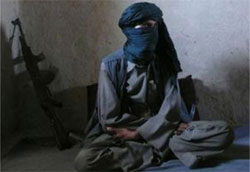 A photo exhibition entitled ”Afghanistan 1973 & 2009 – One Country / Two Worlds” is shown in Stockholm 1–3 December 2010. The photos, on display at Kafé Klaver, Rutger Fuchsgatan 5, are shot by Gert Holmertz and Jesper Huor. The exhibition is organised by the Swedish Committe for Afghanistan (SCA) and Folke Bernadotteakademin. More information.
A photo exhibition entitled ”Afghanistan 1973 & 2009 – One Country / Two Worlds” is shown in Stockholm 1–3 December 2010. The photos, on display at Kafé Klaver, Rutger Fuchsgatan 5, are shot by Gert Holmertz and Jesper Huor. The exhibition is organised by the Swedish Committe for Afghanistan (SCA) and Folke Bernadotteakademin. More information.
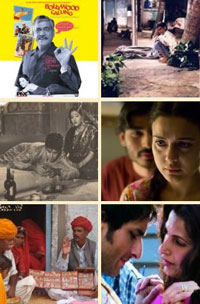 • Satyajit Ray retrospective at the 2010 Florence Indian Film Festival
• Satyajit Ray retrospective at the 2010 Florence Indian Film Festival
The 10th edition of River to River. Florence Indian Film Festival will be held 3–9 December 2010 in Florence, Italy. The River to River festival, under the Patronage of the Embassy of India in Rome, is the first festival in the world entirely devoted to films from and about India.
To celebrate its 10th anniversary, River to River. Florence Indian Film Festival pays homage to multi-award winner and celebrated director Satyajit Ray, screening a retrospective series of his best films. Museo Marino Marini will also host a photographic exhibition on Nemai Ghosh, Ray’s director of photography, who will be in Florence to present his works. The exhibition is organised in collaboration with the Indian Council for Cultural Relations of New Delhi.
On the mornings of Saturday 4th, Sunday 5th and Wednesday 8th December, talks and workshops on India, its cinema and its culture will be held at Cinema Odeon, the main festival venue. More information about the 2010 film festival.
• More information about South Asia related culture
in Sweden/ Scandinavia
See SASNET’s page, http://www.sasnet.lu.se/culture.html
New and updated items on SASNET web site
• Swedish departments where research on
South Asia is going on:
Constantly added to the list of research environments at Swedish
universities, presented by SASNET. The full list now includes 271 departments,
with detailed descriptions of the South Asia related research and education
taking place! Go to http://www.sasnet.lu.se/environment.html
• Useful travelling information
Look at http://www.sasnet.lu.se/travelling.html.
Updated travel advises from the The British Foreign & Commonwealth
Office about safety aspects on travelling to the countries of
South Asia. Recent changed information on Afghanistan, Bangladesh and Pakistan.
Best regards,
Lars Eklund
deputy director/webmaster
SASNET/Swedish South Asian Studies Network
SASNET is a national network for research, education, and information about South Asia based at Lund University. Its aim is to promote a dynamic networking process in which Swedish researchers co-operate with researchers in South Asia and globally.
The SASNET network is open to all the sciences. Priority is given to interdisciplinary cooperation across faculties, and more particularly to institutions in the Nordic countries and South Asia. SASNET believes that South Asian studies will be most fruitfully pursued as a cooperative endeavour between researchers in different institutions who have a solid base in their mother disciplines.
The network is financed by Lund
University.
Postal address: SASNET – Swedish South Asian Studies Network,
Scheelevägen 15 D, SE-223 70 Lund, Sweden
Visiting address: Ideon Research Park, House Alpha 1 (first floor,
room no. 2040), in the premises of the Centre for East and South
East Asian Studies at Lund University (ACE).
Phone: + 46 46 222 73 40
Fax: + 46 46 222 30 41
E-mail: sasnet@sasnet.lu.se
Web site:
http://www.sasnet.lu.se
SASNET - Swedish South Asian Studies Network/Lund
University
Address: Scheelevägen 15 D, SE-223 70 Lund, Sweden
Phone: +46 46 222 73 40
Webmaster: Lars Eklund
Last updated
2011-01-12
